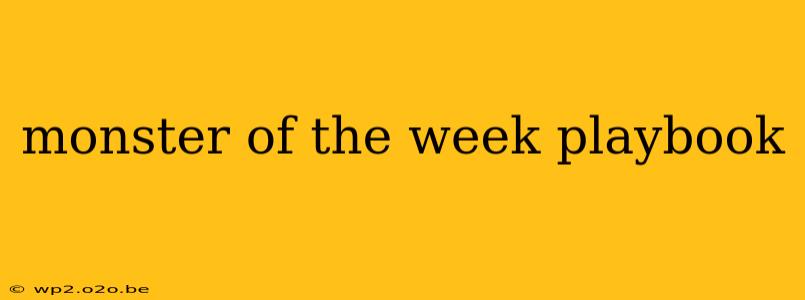The "Monster of the Week" (MOTW) format, a staple of genre television and literature, offers a flexible framework for storytelling that keeps audiences engaged week after week, or chapter after chapter. While seemingly simple—a new threat each episode/chapter—creating truly compelling MOTW stories requires careful planning and execution. This playbook delves into the key elements needed to craft memorable and effective MOTW narratives.
Understanding the Core Principles
The beauty of the MOTW format lies in its adaptability. It's not just about the monster itself; it's about the impact the monster has on the characters and the world they inhabit. Several core principles underpin successful MOTW stories:
-
Self-Contained Narratives: Each episode or chapter should tell a complete story, with a clear beginning, middle, and end. This allows for easy consumption and prevents the audience from feeling lost if they miss an installment.
-
Recurring Characters & Relationships: While the antagonist changes, the core characters and their relationships provide the emotional anchor. Their growth, struggles, and bonds drive the overarching narrative arc even amidst the weekly monster hunts.
-
Thematic Consistency: While the monsters vary, a recurring theme or set of themes should subtly connect each episode/chapter. This could be exploring social issues, questioning morality, or examining human nature through the lens of the fantastical.
-
World-Building: Even within a self-contained structure, the world surrounding the characters needs depth. Consistent world-building gradually reveals the nuances of the setting, creating a rich and believable environment.
Crafting the Perfect Monster
The "monster" is more than just a creature; it's a symbol, a reflection of fears, societal anxieties, or thematic concerns. Consider these aspects when designing your MOTW antagonists:
1. The Monster's Nature:
-
Physical Attributes: What does it look like? What are its powers and weaknesses? A compelling design is essential—both visually and conceptually.
-
Motivation: Why is it attacking? What are its goals? A monster with a clear motivation, even if monstrous, makes it far more engaging than a random agent of chaos.
-
Symbolic Meaning: What does the monster represent? Does it reflect a societal fear, a psychological trauma, or a moral failing?
2. The Monster's Impact:
-
Scale of Threat: How much damage does the monster inflict? The scale should match the overall tone and stakes of your story.
-
Emotional Resonance: Does the monster evoke fear, empathy, disgust, or a complex mix of emotions? The emotional impact is crucial for audience engagement.
-
Consequences: What are the lasting consequences of the monster's attack? This could range from physical damage to emotional scars, affecting the characters and their world.
Beyond the Monster: Elevating the Narrative
The monster itself is just one ingredient in a successful MOTW story. Consider these additional factors:
-
Character Development: The characters' reactions to the monster, their growth, and their relationships are equally important.
-
Mystery and Intrigue: Leave clues, hints, and unanswered questions to keep the audience guessing and invested.
-
Subplots: Develop recurring subplots involving the characters' personal lives to add emotional depth and complexity.
-
World-Building Expansion: Gradually reveal more about the world, its history, its rules, and its inhabitants.
Examples of Successful MOTW Storytelling:
Series like Buffy the Vampire Slayer, Supernatural, and The X-Files masterfully demonstrate the potential of the MOTW format. They showcase compelling monster designs, consistent thematic elements, and strong character arcs. Analyzing these successful examples can offer valuable insights into crafting your own engaging MOTW narratives.
By carefully crafting the monsters, developing compelling characters, and weaving in consistent themes, you can create a MOTW series or book that is both exciting and deeply resonant with your audience. Remember, it's not just about the monster; it's about the story it tells.

